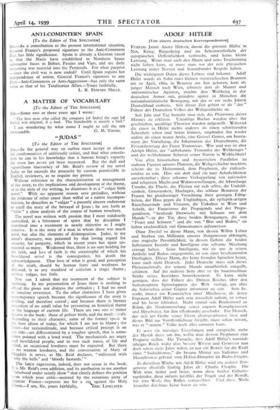4, JUDAS " [To the Editor of THE SPECTATOR] Sia,—In
the general way an author must accept in silence the condemnation of unfriendly critics, and find what consola- tion he can in his knowledge that a human being's capacity for error has never yet been measured. But the dull and supercilious inaccuracy of Mr. Reid's review of my novel Judas so far exceeds the procacity by custom permissible in English 'reviewers, as to require my protest.
Without reference to the characterisation or management of the story, to the implications and development of the theme, or to the style of the writing, he dismisses it as a " vulgar little novel." With no apparent reason save prejudice, without the evidence of other cause than wilful or a native incompre- hension, he describes as " vulgar " a patently sincere endeavour to retell the story of the betrayal of Jesus ; he sets forth as " little " a close analysis of the course of human treachery.
The novel was written with passion that I most sedulously controlled, in a bitterness of spirit that by discipline I translated into a treatment as nearly objective as I might contrive. It is the story of a man in whom there was much good, but also the elements of disintegration. Judas, in my mind's discovery, was poisoned by that loving regard for security, for property, which in recent years has again un- manned so many. Weakened thus, there is no sure holding for his faith, and loss of faith is the catastrophe of which his bewildered mind is the consequence, his death the acknowledgment. That love of what is good, and perception of the truth, should by human fears and weakness be defeated, is to any standard of criticism a tragic theme ; neither vulgar, nor little.
Nor can I admit that my treatment of the subject is unfitting. In my presentation of Jesus there is nothing to offend the pious nor distress the orthodox ; I had no need to simulate reverence. To the other characters I have given contemporary speech because the significance of the story is abiding, and therefore coeval ; and because there is literary precedent of no small value for presenting an historical theme in the language of current life. There are two sets of minor figures in the book : those of politer birth, and the mech..nicals. According to their character, some of the former speak in the bare idiom of today, for which I am not to blame ; the latter—for verisimilitude, and because critical precept is on my side—are differentiated by a rougher speech, that is some- times pointed with a lewd word. The mechanicals are angry and bewildered people, and in two such states, of life and mind, an occasional lewdness must be expected. But there is no wanton lewdness, and the conversation of Mary of Magdala is never, as Mr. Reid declares, " enlivened with why the hells' and ' bloody bastards."
The latter expression, indeed, does not occur in the book. It is Mr. Reid's own addition, and its attribution to me another falsehood under saintly show " that clearly defines the position from which your critic—assisted by the notorious piety of Anatole France—reproves me for a sizittainst the Holy






































 Previous page
Previous page